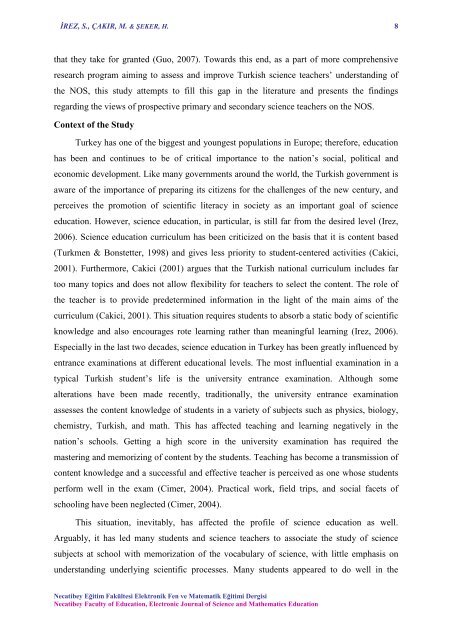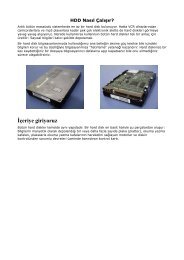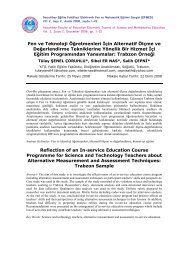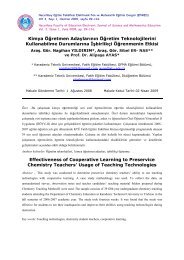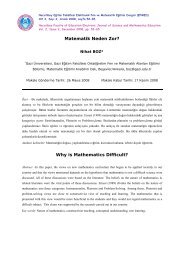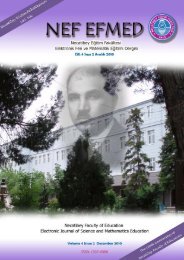- Page 2 and 3: Necatibey Faculty of Education, Ele
- Page 4 and 5: Assist.Prof. Dr. Gökhan Demircioğ
- Page 6 and 7: İlköğretim Öğretmenlerinin Kul
- Page 8 and 9: Necatibey Eğitim Fakültesi Elektr
- Page 10 and 11: IŞILDAK, R.S. 3 Phase 1 Phase 2 Fi
- Page 12 and 13: IŞILDAK, R.S. 5 Figure 7 The force
- Page 16 and 17: 9 EXPLORING NATURE OF SCIENCE UNDER
- Page 18 and 19: 11 EXPLORING NATURE OF SCIENCE UNDE
- Page 20 and 21: 13 EXPLORING NATURE OF SCIENCE UNDE
- Page 22 and 23: 15 EXPLORING NATURE OF SCIENCE UNDE
- Page 24 and 25: 17 EXPLORING NATURE OF SCIENCE UNDE
- Page 26 and 27: 19 UNDERSTANDING THE IMPACT OF FORM
- Page 28 and 29: 21 UNDERSTANDING THE IMPACT OF FORM
- Page 30 and 31: 23 UNDERSTANDING THE IMPACT OF FORM
- Page 32 and 33: 25 UNDERSTANDING THE IMPACT OF FORM
- Page 34 and 35: 27 UNDERSTANDING THE IMPACT OF FORM
- Page 36 and 37: 29 UNDERSTANDING THE IMPACT OF FORM
- Page 38 and 39: 31 UNDERSTANDING THE IMPACT OF FORM
- Page 40 and 41: 33 UNDERSTANDING THE IMPACT OF FORM
- Page 42 and 43: 35 UNDERSTANDING THE IMPACT OF FORM
- Page 44 and 45: 37 UNDERSTANDING THE IMPACT OF FORM
- Page 46 and 47: 39 UNDERSTANDING THE IMPACT OF FORM
- Page 48 and 49: 41 UNDERSTANDING THE IMPACT OF FORM
- Page 50 and 51: 43 BİTKİLERDE TAŞIMA SİSTEMİ K
- Page 52 and 53: 45 BİTKİLERDE TAŞIMA SİSTEMİ K
- Page 54 and 55: 47 BİTKİLERDE TAŞIMA SİSTEMİ K
- Page 56 and 57: 49 BİTKİLERDE TAŞIMA SİSTEMİ K
- Page 58 and 59: 51 BİTKİLERDE TAŞIMA SİSTEMİ K
- Page 60 and 61: 53 BİTKİLERDE TAŞIMA SİSTEMİ K
- Page 62 and 63: 55 BİTKİLERDE TAŞIMA SİSTEMİ K
- Page 64 and 65:
57 BİTKİLERDE TAŞIMA SİSTEMİ K
- Page 66 and 67:
59 FEN ÖĞRETİMİNDE KAVRAM KARİ
- Page 68 and 69:
61 FEN ÖĞRETİMİNDE KAVRAM KARİ
- Page 70 and 71:
63 FEN ÖĞRETİMİNDE KAVRAM KARİ
- Page 72 and 73:
65 FEN ÖĞRETİMİNDE KAVRAM KARİ
- Page 74 and 75:
67 FEN ÖĞRETİMİNDE KAVRAM KARİ
- Page 76 and 77:
69 FEN ÖĞRETİMİNDE KAVRAM KARİ
- Page 78 and 79:
71 FEN ÖĞRETİMİNDE KAVRAM KARİ
- Page 80 and 81:
73 FEN ÖĞRETİMİNDE KAVRAM KARİ
- Page 82 and 83:
75 FEN ÖĞRETİMİNDE KAVRAM KARİ
- Page 84 and 85:
77 FEN ÖĞRETİMİNDE KAVRAM KARİ
- Page 86 and 87:
79 FEN ÖĞRETİMİNDE KAVRAM KARİ
- Page 88 and 89:
81 FEN ÖĞRETİMİNDE KAVRAM KARİ
- Page 90 and 91:
83 FEN ÖĞRETİMİNDE KAVRAM KARİ
- Page 92 and 93:
85 FEN ÖĞRETİMİNDE KAVRAM KARİ
- Page 94 and 95:
87 FEN BİLGİSİ ÖĞRETMEN ADAYLA
- Page 96 and 97:
89 FEN BİLGİSİ ÖĞRETMEN ADAYLA
- Page 98 and 99:
91 FEN BİLGİSİ ÖĞRETMEN ADAYLA
- Page 100 and 101:
93 FEN BİLGİSİ ÖĞRETMEN ADAYLA
- Page 102 and 103:
95 FEN BİLGİSİ ÖĞRETMEN ADAYLA
- Page 104 and 105:
97 FEN BİLGİSİ ÖĞRETMEN ADAYLA
- Page 106 and 107:
99 FEN BİLGİSİ ÖĞRETMEN ADAYLA
- Page 108 and 109:
101 FEN BİLGİSİ ÖĞRETMEN ADAYL
- Page 110 and 111:
103 FEN BİLGİSİ ÖĞRETMEN ADAYL
- Page 112 and 113:
105 FEN BİLGİSİ ÖĞRETMEN ADAYL
- Page 114 and 115:
107 FEN BİLGİSİ ÖĞRETMEN ADAYL
- Page 116 and 117:
109 FEN BİLGİSİ ÖĞRETMEN ADAYL
- Page 118 and 119:
111 FEN BİLGİSİ ÖĞRETMEN ADAYL
- Page 120 and 121:
113 FEN BİLGİSİ ÖĞRETMEN ADAYL
- Page 122 and 123:
Necatibey Eğitim Fakültesi Elektr
- Page 124 and 125:
ÖNEN,F., ERDEM, A., UZAL, G. & GÜ
- Page 126 and 127:
ÖNEN,F., ERDEM, A., UZAL, G. & GÜ
- Page 128 and 129:
ÖNEN,F., ERDEM, A., UZAL, G. & GÜ
- Page 130 and 131:
ÖNEN,F., ERDEM, A., UZAL, G. & GÜ
- Page 132 and 133:
ÖNEN,F., ERDEM, A., UZAL, G. & GÜ
- Page 134 and 135:
ÖNEN,F., ERDEM, A., UZAL, G. & GÜ
- Page 136 and 137:
ÖNEN,F., ERDEM, A., UZAL, G. & GÜ
- Page 138 and 139:
ÖNEN,F., ERDEM, A., UZAL, G. & GÜ
- Page 140 and 141:
ÖNEN,F., ERDEM, A., UZAL, G. & GÜ
- Page 142 and 143:
ÖNEN,F., ERDEM, A., UZAL, G. & GÜ
- Page 144 and 145:
ÖNEN,F., ERDEM, A., UZAL, G. & GÜ
- Page 146 and 147:
139 İLKÖĞRETİM ÖĞRETMENLERİN
- Page 148 and 149:
141 İLKÖĞRETİM ÖĞRETMENLERİN
- Page 150 and 151:
143 İLKÖĞRETİM ÖĞRETMENLERİN
- Page 152 and 153:
145 İLKÖĞRETİM ÖĞRETMENLERİN
- Page 154 and 155:
147 İLKÖĞRETİM ÖĞRETMENLERİN
- Page 156 and 157:
149 İLKÖĞRETİM ÖĞRETMENLERİN
- Page 158 and 159:
151 İLKÖĞRETİM ÖĞRETMENLERİN
- Page 160 and 161:
153 İLKÖĞRETİM ÖĞRETMENLERİN
- Page 162 and 163:
155 İLKÖĞRETİM ÖĞRETMENLERİN
- Page 164 and 165:
157 11. SINIF ÖĞRENCİLERİNİN
- Page 166 and 167:
159 11. SINIF ÖĞRENCİLERİNİN
- Page 168 and 169:
161 11. SINIF ÖĞRENCİLERİNİN
- Page 170 and 171:
163 11. SINIF ÖĞRENCİLERİNİN
- Page 172 and 173:
165 11. SINIF ÖĞRENCİLERİNİN
- Page 174 and 175:
167 11. SINIF ÖĞRENCİLERİNİN
- Page 176 and 177:
169 11. SINIF ÖĞRENCİLERİNİN
- Page 178 and 179:
171 11. SINIF ÖĞRENCİLERİNİN
- Page 180 and 181:
173 11. SINIF ÖĞRENCİLERİNİN
- Page 182 and 183:
175 11. SINIF ÖĞRENCİLERİNİN
- Page 184 and 185:
177 11. SINIF ÖĞRENCİLERİNİN
- Page 186 and 187:
179 OKUL DIŞI BİLİMSEL ETKİNLİ
- Page 188 and 189:
181 OKUL DIŞI BİLİMSEL ETKİNLİ
- Page 190 and 191:
183 OKUL DIŞI BİLİMSEL ETKİNLİ
- Page 192 and 193:
185 OKUL DIŞI BİLİMSEL ETKİNLİ
- Page 194 and 195:
187 OKUL DIŞI BİLİMSEL ETKİNLİ
- Page 196 and 197:
189 OKUL DIŞI BİLİMSEL ETKİNLİ
- Page 198 and 199:
191 OKUL DIŞI BİLİMSEL ETKİNLİ
- Page 200 and 201:
193 OKUL DIŞI BİLİMSEL ETKİNLİ
- Page 202 and 203:
195 OKUL DIŞI BİLİMSEL ETKİNLİ
- Page 204 and 205:
197 OKUL DIŞI BİLİMSEL ETKİNLİ
- Page 206 and 207:
Necatibey Eğitim Fakültesi Elektr
- Page 208 and 209:
ÜLTAY, N. & ÇALIK, M. 201 The mat
- Page 210 and 211:
ÜLTAY, N. & ÇALIK, M. 203 yapıla
- Page 212 and 213:
ÜLTAY, N. & ÇALIK, M. 205 içerme
- Page 214 and 215:
ÜLTAY, N. & ÇALIK, M. 207 ‘Asit
- Page 216 and 217:
ÜLTAY, N. & ÇALIK, M. 209 Şekil
- Page 218 and 219:
ÜLTAY, N. & ÇALIK, M. 211 Şekil
- Page 220 and 221:
ÜLTAY, N. & ÇALIK, M. 213 Şekil
- Page 222 and 223:
ÜLTAY, N. & ÇALIK, M. 215 5E mode
- Page 224 and 225:
ÜLTAY, N. & ÇALIK, M. 217 zorunlu
- Page 226 and 227:
ÜLTAY, N. & ÇALIK, M. 219 Demirci
- Page 228 and 229:
Necatibey Eğitim Fakültesi Elektr
- Page 230 and 231:
AYKUTLU, I. & ŞEN, A.İ. 223 The r
- Page 232 and 233:
AYKUTLU, I. & ŞEN, A.İ. 225 kavra
- Page 234 and 235:
AYKUTLU, I. & ŞEN, A.İ. 227 gör
- Page 236 and 237:
AYKUTLU, I. & ŞEN, A.İ. 229 üç
- Page 238 and 239:
AYKUTLU, I. & ŞEN, A.İ. 231 kulla
- Page 240 and 241:
AYKUTLU, I. & ŞEN, A.İ. 233 Test
- Page 242 and 243:
AYKUTLU, I. & ŞEN, A.İ. 235 Öğr
- Page 244 and 245:
AYKUTLU, I. & ŞEN, A.İ. 237 A: Se
- Page 246 and 247:
AYKUTLU, I. & ŞEN, A.İ. 239 Tablo
- Page 248 and 249:
AYKUTLU, I. & ŞEN, A.İ. 241 Tablo
- Page 250 and 251:
AYKUTLU, I. & ŞEN, A.İ. 243 kavra
- Page 252 and 253:
AYKUTLU, I. & ŞEN, A.İ. 245 Berbe
- Page 254 and 255:
AYKUTLU, I. & ŞEN, A.İ. 247 Duit,
- Page 256 and 257:
AYKUTLU, I. & ŞEN, A.İ. 249 Pına
- Page 258 and 259:
Necatibey Eğitim Fakültesi Elektr
- Page 260 and 261:
KÖSE, N. Y. &TANIŞLI, D. 253 stan
- Page 262 and 263:
KÖSE, N. Y. &TANIŞLI, D. 255 İlk
- Page 264 and 265:
KÖSE, N. Y. &TANIŞLI, D. 257 (Fal
- Page 266 and 267:
KÖSE, N. Y. &TANIŞLI, D. 259 1 2
- Page 268 and 269:
KÖSE, N. Y. &TANIŞLI, D. 261 Bu a
- Page 270 and 271:
KÖSE, N. Y. &TANIŞLI, D. 263 stan
- Page 272 and 273:
KÖSE, N. Y. &TANIŞLI, D. 265 Kita
- Page 274 and 275:
KÖSE, N. Y. &TANIŞLI, D. 267 veri
- Page 276 and 277:
KÖSE, N. Y. &TANIŞLI, D. 269 Şek
- Page 278 and 279:
KÖSE, N. Y. &TANIŞLI, D. 271 yoğ
- Page 280 and 281:
KÖSE, N. Y. &TANIŞLI, D. 273 Sonu
- Page 282 and 283:
KÖSE, N. Y. &TANIŞLI, D. 275 McNe
- Page 284 and 285:
KÖSE, N. Y. &TANIŞLI, D. 277 EK-2
- Page 286 and 287:
279 MATEMATİK TARİHİNİN KULLANI
- Page 288 and 289:
281 MATEMATİK TARİHİNİN KULLANI
- Page 290 and 291:
283 MATEMATİK TARİHİNİN KULLANI
- Page 292 and 293:
285 MATEMATİK TARİHİNİN KULLANI
- Page 294 and 295:
287 MATEMATİK TARİHİNİN KULLANI
- Page 296 and 297:
289 MATEMATİK TARİHİNİN KULLANI
- Page 298 and 299:
291 MATEMATİK TARİHİNİN KULLANI
- Page 300 and 301:
293 MATEMATİK TARİHİNİN KULLANI
- Page 302 and 303:
295 MATEMATİK TARİHİNİN KULLANI
- Page 304 and 305:
297 MATEMATİK TARİHİNİN KULLANI
- Page 306 and 307:
299 MATEMATİK TARİHİNİN KULLANI
- Page 308 and 309:
301 MATEMATİK TARİHİNİN KULLANI
- Page 310 and 311:
303 MATEMATİK TARİHİNİN KULLANI
- Page 312 and 313:
305 MATEMATİK TARİHİNİN KULLANI
- Page 314 and 315:
307 MATEMATİK TARİHİNİN KULLANI
- Page 316 and 317:
309 MATEMATİK TARİHİNİN KULLANI
- Page 318 and 319:
311 MATEMATİK TARİHİNİN KULLANI
- Page 320 and 321:
313 TÜRKİYE VE MALEZYA FİZİK Ö
- Page 322 and 323:
315 TÜRKİYE VE MALEZYA FİZİK Ö
- Page 324 and 325:
317 TÜRKİYE VE MALEZYA FİZİK Ö
- Page 326 and 327:
319 TÜRKİYE VE MALEZYA FİZİK Ö
- Page 328 and 329:
321 TÜRKİYE VE MALEZYA FİZİK Ö
- Page 330 and 331:
323 TÜRKİYE VE MALEZYA FİZİK Ö
- Page 332 and 333:
325 TÜRKİYE VE MALEZYA FİZİK Ö
- Page 334 and 335:
327 TÜRKİYE VE MALEZYA FİZİK Ö
- Page 336 and 337:
329 TÜRKİYE VE MALEZYA FİZİK Ö
- Page 338 and 339:
331 TÜRKİYE VE MALEZYA FİZİK Ö
- Page 340 and 341:
333 TÜRKİYE VE MALEZYA FİZİK Ö
- Page 342 and 343:
335 TÜRKİYE VE MALEZYA FİZİK Ö


